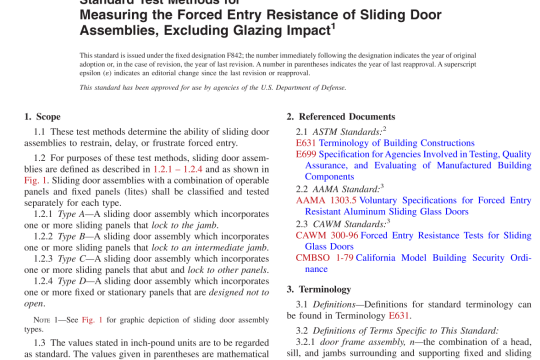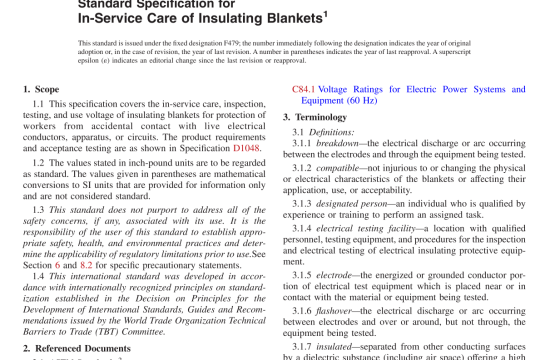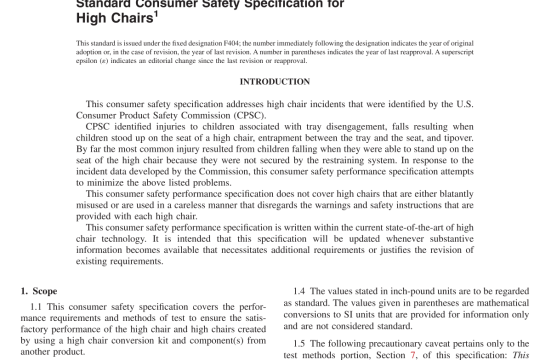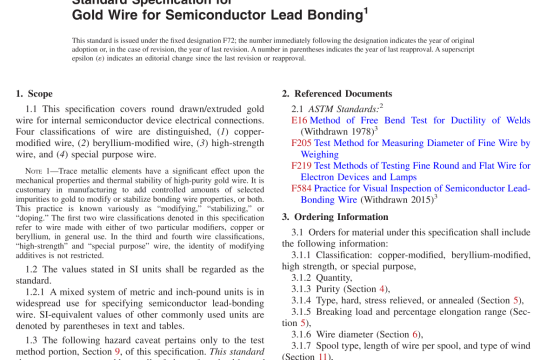ASTM A574-2017 pdf free download
ASTM A574-2017 pdf free download.Standard Specification for Alloy Steel Socket-Head Cap Screws
1. Scope
1.1 This specification covers the requirements for quenched and tempered alloy steel hexagon socket-head cap screws, 0.060 through 4 in. in diameter where high strength is required. 1.2 The values stated in inch-pound units are to be regarded as standard. No other units ofmeasurement are included in this standard. 1.3 The following hazard caveat pertains only to the test method portions, sections 5.1, 5.6, 8, and 12, of this specifi- cation. This standard does not purport to address all of the safety concerns, if any, associated with its use. It is the responsibility of the user of this standard to establish appro- priate safety and health practices and determine the applica- bility ofregulatory limitations prior to use. 1.4 This international standard was developed in accor- dance with internationally recognized principles on standard- ization established in the Decision on Principles for the Development of International Standards, Guides and Recom- mendations issued by the World Trade Organization Technical Barriers to Trade (TBT) Committee.
5. Materials and Manufacture
5.1 The screws shall be fabricated from alloy steel made to a fine grain practice. In the event of controversy over grain size, referee tests on finished screws conducted in accordance with Test Methods E112 shall prevail. 5.2 Screws in sizes through 0.750 in. diameter, and with lengths through ten times the nominal product size or 6.0 inches, whichever is shorter, shall be cold headed, except that when specified by the purchaser the screws shall be hot headed. Larger sizes and longer lengths shall be cold or hot headed at the option of the manufacturer, unless otherwise specified by the purchaser. Screws larger than 1.500 in. nominal diameter shall be permitted to be machined. Sockets shall be forged or machined at the option of the manufacturer. 5.3 Screws in sizes through 0.625 in. diameter, and for product lengths through 4 in. shall be roll threaded, unless otherwise specified by the purchaser. Larger products shall be rolled, cut, or ground at the option of the manufacturer. 5.4 Screws shall be heat treated by quenching in oil from above the transformation temperature and then tempered by reheating to at least 700°F to achieve the mechanical properties specified in Section 7 and Table 1. 5.4.1 When specified by the purchaser, the minimum tem- pering temperature shall be verified by subjecting screws to 680°F for 30 minutes at temperature. The mean cross section hardness of three readings on the screw before and after retempering shall not differ by more than 2 points hardness Rockwell C (HRC). 5.5 Standard Finishes—Unless otherwise specified, the screws shall be furnished with one of the following “standard surfaces as manufactured” at the option of the manufacturer:(1) bright uncoated, (2) thermal black oxide, or (3) chemical black oxide. Hydrogen embrittlement tests shall not be re- quired for screws furnished in these conditions. 5.6 Protective Coatings: 5.6.1 When a protective finish other than as specified in 5.5 is required, it shall be specified on the purchase order with the applicable finish specification. 5.6.2 When protective or decorative coatings are applied to the screws, precautions specified by the coating requirements to minimize internal hydrogen embrittlement shall be exer- cised. Additional precautions such as the requirements in Test Method F1940 and Test Methods F606/F606M shall be by agreement with the purchaser.
6. Chemical Composition
6.1 The screws shall be alloy steel conforming to the chemical composition specified in Table 2 and the require- ments in Specification F2282. See Supplementary Requirement S1 when additional alloy steel grades are required. 6.2 One or more of the following alloying elements: chromium, nickel, molybdenum, or vanadium shall be present in sufficient quantity to ensure that the specified strength properties are met after oil quenching and tempering. As a guide for selecting material, an alloy steel should be capable of meeting the specified mechanical requirements if the “as oil quenched” core hardness one diameter from the point is equal to or exceeds 25 HRC + (55 × carbon content).




